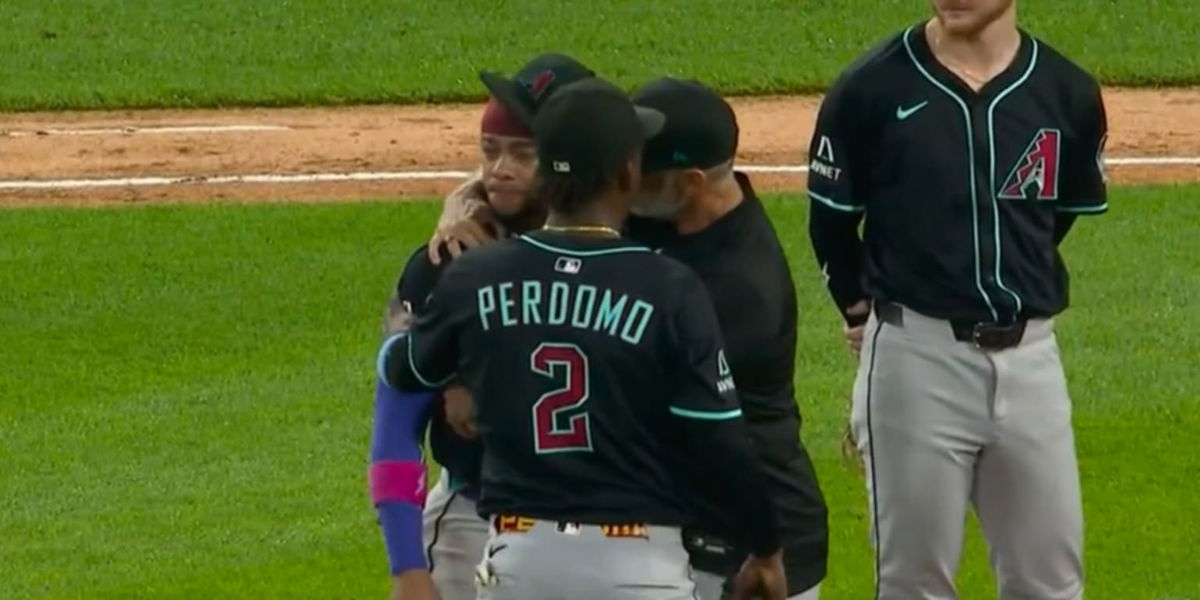
Imago
Credit: MLB.com

Imago
Credit: MLB.com

Imago
Credit: MLB.com

Imago
Credit: MLB.com
When ballplayers get heckled, they’re told to “toughen up.” But what about their families? The bleachers may be loud, but the internet is merciless. After Ketel Marte’s emotional moment, another story surfaced—one that didn’t unfold on the field. The Boston Red Sox star’s family found themselves in the middle of a quieter storm, and this time, the pain came not from a pitch but from a post.
Watch What’s Trending Now!
What is wrong with people? Baseball is a sport, and the players are human beings, not assets that one can abuse whenever they feel like. They know the position they are in and the pressure on them. They don’t need people sliding into their DM’s telling them how to play a sport. It is like the Ketel Marte incident has opened a Pandora’s box, and everything is just spilling out.
After Ketel Marte was abused by a White Sox fan, Garrett Whitlock’s wife, Jordan, revealed the abuses she and her family got after a few bad performances by the pitcher. A Boston reporter named Gabrielle Starr posted on her X handle the Instagram Stories the player’s wife had put up after the incident. She wrote, “Garrett Whitlock’s wife, Jordan, weighed in on the Ketel Marte incident and shared some truly horrible DMs their family received this week.”
Some fans didn’t just cross a line—they torched it and danced on the ashes. Jordan Whitlock shared DMs with death threats aimed at her husband, herself, and their children. Imagine hating a pitch so much that you wish harm on a toddler. These aren’t fans—they’re cowards hiding behind screens, poisoning a game built on heart.
Things can’t get this bad, and you can’t just wish for someone’s family to suffer because of a game. MLB players may wear armor, but words find their way through the cracks. From dugout jeers to online insults, the abuse rarely stops at the foul lines. Players are expected to perform under pressure, not under personal attack. Yet, far too often, fans forget there’s a person beneath the jersey and stats.
Garrett Whitlock’s wife, Jordan, weighed in on the Ketel Marte incident and shared some truly horrible DMs their family received this week. pic.twitter.com/w0FaIugRYw
— Gabrielle Starr (@gfstarr1) June 26, 2025
The damage doesn’t end with the player—it bleeds into their homes and families. Loved ones read those comments, hear those boos, feel that hate. The mental toll builds, sometimes quietly, sometimes all at once. No walk-off win can fix a heart that’s been heckled raw.
And when this becomes the norm, the game suffers more than any box score shows. Abuse taints the joy, driving wedges between players and the crowd. Baseball becomes less about unity and more about division and cruelty. That’s not the game we fell in love with.
If a bad outing leads to death threats, maybe the problem isn’t the ERA. From Garrett Whitlock and his wife’s inbox to Ketel Marte’s heartbreak, the message is loud and rotten. Fans can boo a play—but not bruise a soul. Baseball doesn’t need thicker skin; it needs a better conscience. If this is passion, then it’s time we redefine what fandom really means.
Red Sox’s Liam Hendriks speaks out—Is online abuse just a symptom of something darker brewing?
There was a time when booing from the bleachers was as bad as it got. Now, it’s death threats in the DMs and cancer jokes from faceless profiles. The line between fan and fanatic has officially disintegrated. And while MLB cashes in on engagement, Red Sox pitcher Liam Hendriks is left holding receipts of hate. What’s brewing isn’t just outrage—it’s something uglier, louder, and dangerously normalized.
Liam Hendriks beat cancer, but he’s now facing a different kind of sickness—online hate. After the Red Sox lost to the Mets, Hendriks was flooded with threats. “Threats against my life and my wife’s life are horrible and cruel. You need help,” he posted on Instagram. He added, “Leaving comments to tell me to commit suicide and how you wish I died of cancer is disgusting and vile.”
Hendriks didn’t just absorb the blows—he fired back with clarity. “Maybe you should step back and reevaluate your life’s purpose before hiding behind a screen and attacking players and their families,” he wrote. It wasn’t a rant. It was a message—sharpened by pain, aimed at a culture spinning out.
Across the league, players are echoing Hendriks’ frustration, and many point fingers at gambling. Justin Wilson put it plainly: “You get a lot of DMs or stuff like that about you ruining someone’s bet or something ridiculous like that… I guess they should make better bets.” The message is clear—losing a game shouldn’t cost a player peace.
Christian Yelich has seen the abuse rise. “It’s increased to the point that you’re just: ‘All right, here we go.’ It doesn’t even really register on your radar anymore,” he said. “You’re just so used to that on a day-to-day, night-to-night basis.” That numbness is telling. This isn’t fan passion—it’s addiction-fueled cruelty.
What started as harmless heckling has mutated into a full-blown moral rot, monetized and ignored. The silence from those in charge isn’t just disappointing—it’s enabling. If sports betting is the new national pastime, then unchecked rage is its loyal mascot. Players aren’t just fighting slumps anymore; they’re dodging digital grenades. Maybe it’s time the league starts protecting more than just its bottom line.

